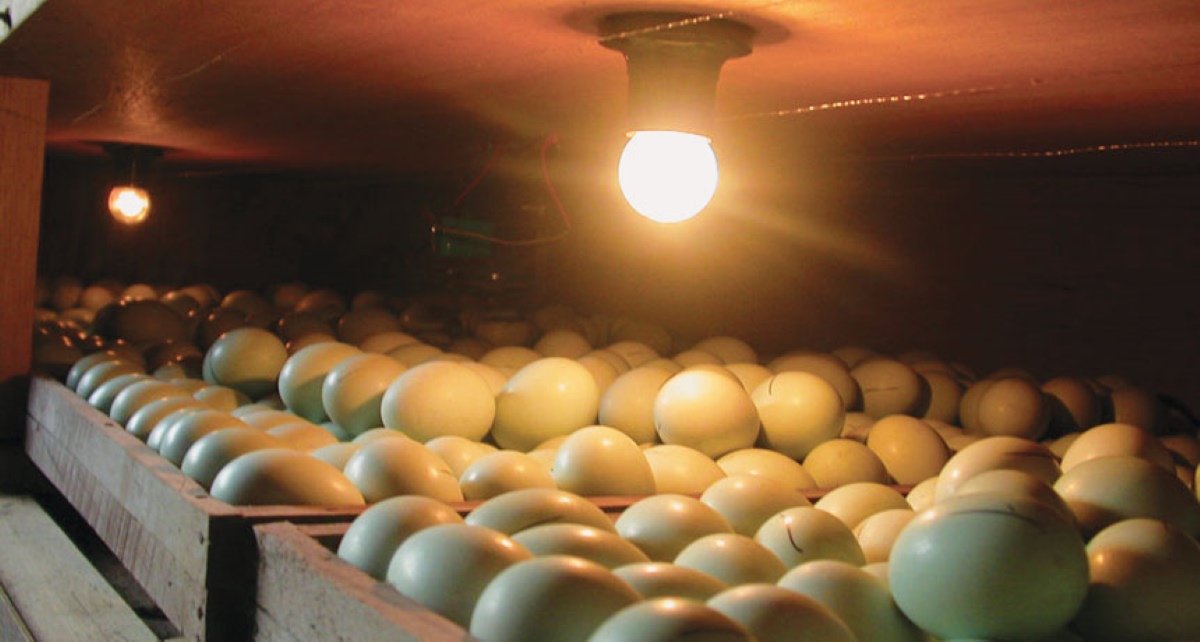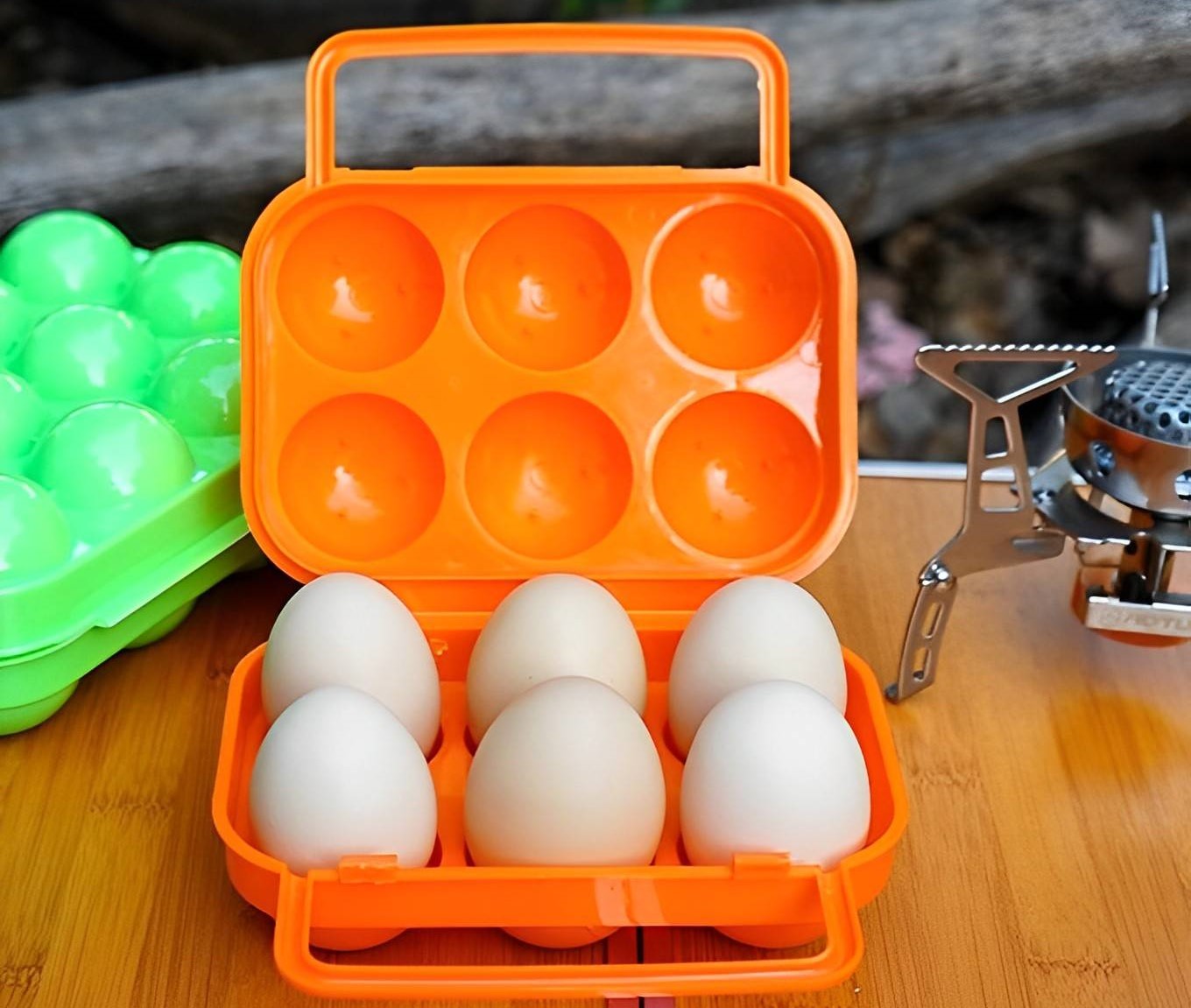

Articles
How To Store Dehydrated Eggs
Modified: February 27, 2024
Looking for articles on how to store dehydrated eggs? Discover expert tips, techniques, and guidelines for proper storage in our informative guide.
(Many of the links in this article redirect to a specific reviewed product. Your purchase of these products through affiliate links helps to generate commission for Storables.com, at no extra cost. Learn more)
Introduction
Welcome to our comprehensive guide on how to store dehydrated eggs. Whether you are a seasoned prepper, a camping enthusiast, or simply looking to extend the shelf life of your eggs, dehydrating eggs can be a practical and convenient solution. Dehydrated eggs can last for an extended period of time without refrigeration, making them an ideal pantry staple.
In this article, we will explore the benefits of storing dehydrated eggs, discuss the factors to consider before storing, provide a step-by-step guide on how to store them, and offer tips on how to extend their shelf life. We will also cover how to properly rehydrate and use dehydrated eggs, along with some frequently asked questions.
So, whether you have a surplus of fresh eggs that you want to preserve, or you simply want to have a backup supply of eggs on hand for emergencies, continue reading to learn everything you need to know about storing dehydrated eggs.
Key Takeaways:
- Dehydrated eggs offer extended shelf life, space-saving convenience, and versatility in the kitchen, making them a cost-effective and practical addition to any pantry or emergency food supply.
- Proper storage, including dehydration, airtight containers, and ideal conditions, ensures the longevity and quality of dehydrated eggs, providing a reliable source of protein and culinary flexibility.
Read more: How To Dehydrate Eggs Without A Dehydrator
Benefits of Storing Dehydrated Eggs
Storing dehydrated eggs offers a range of benefits that make them an excellent addition to any pantry. Here are a few key advantages:
- Extended Shelf Life: Dehydrated eggs have a significantly longer shelf life compared to fresh eggs. While fresh eggs typically last for a few weeks in the refrigerator, properly stored dehydrated eggs can last up to a year or more. This extended shelf life makes them a reliable and convenient option for long-term storage.
- Space Saving: Dehydrated eggs are lightweight and compact, allowing you to save valuable space in your pantry or emergency supply stash. Since they are dehydrated, the moisture is removed, reducing their size and weight significantly.
- Cost-Effective: Buying dehydrated eggs in bulk and storing them for an extended period can be a cost-effective solution. Instead of constantly buying fresh eggs, which can be expensive, investing in dehydrated eggs can help you save money in the long run.
- Versatility: Dehydrated eggs can be rehydrated and used in various dishes, making them versatile in the kitchen. You can use them in baked goods, omelets, scrambled eggs, or any recipe that calls for eggs. They provide the same nutritional value as fresh eggs, making them an excellent substitute.
- Convenience: Having dehydrated eggs on hand eliminates the need to rush to the store when you run out of fresh eggs. They are readily available whenever you need them, allowing you to save time and effort.
- Emergency Preparedness: Dehydrated eggs are a popular choice for emergency preparedness. During times of natural disasters or other emergencies, when access to fresh food may be limited, having dehydrated eggs can ensure you still have a reliable source of protein.
With their extended shelf life, space-saving nature, cost-effectiveness, versatility, convenience, and emergency preparedness benefits, storing dehydrated eggs is a practical choice for any household.
Factors to Consider Before Storing Dehydrated Eggs
Before diving into the process of storing dehydrated eggs, there are a few factors to consider to ensure the best results:
- Quality of Eggs: The quality of the eggs you use for dehydration will directly impact the quality of the end product. It is important to use fresh, high-quality eggs with intact shells to ensure the best flavor and nutritional value.
- Proper Dehydration: Dehydrating eggs properly is essential for long-term storage. Follow the recommended guidelines for dehydrating eggs to ensure that all moisture is removed. Improper dehydration can lead to spoilage and reduce the shelf life of the dehydrated eggs.
- Storage Containers: Choosing the right storage containers is crucial for preserving the quality of dehydrated eggs. Opt for airtight containers that are specifically designed for long-term food storage. Mason jars, mylar bags, or vacuum-sealed bags are popular options. Make sure the containers are clean, dry, and properly sealed to prevent moisture and air from entering.
- Storage Conditions: The storage conditions play a vital role in maintaining the quality and shelf life of dehydrated eggs. Keep them in a cool, dry, and dark place to prevent exposure to light, moisture, and heat. Avoid storing them near strong-smelling foods, as dehydrated eggs can absorb odors easily.
- Labeling and Rotation: Properly label the storage containers with the date of storage to ensure proper rotation. Dehydrated eggs should be used on a first-in, first-out basis, meaning older batches should be used before newer ones. This helps maintain the freshness of the eggs and prevents any waste.
- Regular Inspection: Periodically inspect the dehydrated eggs for any signs of spoilage, such as mold, off-odors, or discoloration. If you notice any of these signs, discard the affected portion immediately to prevent contamination.
- Rehydration Ratio: Understanding the rehydration ratio is important for using dehydrated eggs in recipes. Different brands may have different ratios, so be sure to read the instructions on the packaging. This will ensure that you rehydrate the eggs correctly and achieve the desired consistency in your dishes.
By considering these factors, you can ensure that your dehydrated eggs maintain their quality, flavor, and nutritional value throughout their storage period.
Proper Storage Containers for Dehydrated Eggs
When it comes to storing dehydrated eggs, choosing the right storage containers is crucial for maintaining their quality and extending their shelf life. Here are some options to consider:
- Mason Jars: Mason jars are a popular choice for storing dehydrated foods, including eggs. They are durable, airtight, and readily available. Choose jars with airtight lids and ensure they are clean and dry before adding the dehydrated eggs. Label the jars with the date of storage for easy rotation.
- Mylar Bags: Mylar bags are another excellent option for long-term storage. They are made of airtight, food-grade material that protects against moisture, light, and oxygen. Mylar bags are lightweight, space-saving, and can be easily sealed with a heat sealer. Remember to label the bags and store them in a cool, dark place.
- Vacuum-Sealed Bags: Vacuum-sealed bags remove all the air from the packaging, ensuring that the dehydrated eggs remain fresh for an extended period. These bags are available in various sizes and are ideal for long-term storage as they provide an airtight seal. Use a vacuum sealer machine for optimal results.
- Airtight Plastic Containers: Airtight plastic containers with snap-on or screw-top lids can also be used for storing dehydrated eggs. Look for containers made from food-grade, BPA-free plastic. Ensure they have a tight seal to prevent air and moisture from entering.
- Food-Grade Buckets: For larger quantities of dehydrated eggs, consider food-grade buckets with airtight lids. These buckets provide ample storage space and are designed to keep ingredients fresh for long periods. Place the dehydrated eggs in resealable mylar bags inside the bucket for added protection.
Regardless of the storage container you choose, it’s important to keep in mind some key principles: store the containers in a cool, dry, and dark place away from direct sunlight or heat sources; ensure that the containers are clean and dry before adding the dehydrated eggs; and label the containers with the date of storage for proper rotation.
By using the appropriate storage containers, you can protect the quality, flavor, and nutritional value of your dehydrated eggs, ensuring they remain fresh and ready for use whenever you need them.
Step-by-Step Guide to Storing Dehydrated Eggs
Storing dehydrated eggs is a simple process that can be done in a few easy steps. Follow this step-by-step guide to ensure proper storage and preserve the quality of your dehydrated eggs:
- Prepare the Dehydrated Eggs: Start by properly dehydrating the eggs. Follow the instructions on your dehydrator or the guidelines provided by the manufacturer. Make sure the eggs are fully dehydrated and any moisture has been removed. This will ensure a longer shelf life.
- Choose the Right Storage Container: Select the appropriate storage container for your dehydrated eggs. Mason jars, mylar bags, vacuum-sealed bags, airtight plastic containers, or food-grade buckets are all viable options. Ensure that the containers are clean, dry, and airtight to maintain the freshness of the eggs.
- Portion the Dehydrated Eggs: Divide the dehydrated eggs into manageable portions before storing. This will make it easier to use them in recipes and prevent the need to open the entire batch at once. If using mylar bags, you can individually portion and seal them for convenience.
- Label and Date the Containers: Label each storage container with the contents and the date of storage. This will aid in proper rotation and ensure that you use the oldest batch of dehydrated eggs first. It’s best to use a permanent marker to ensure the labels don’t fade over time.
- Store in a Cool, Dark Place: Find a cool, dry, and dark location to store your dehydrated eggs. Avoid areas that are prone to temperature fluctuations, such as near the stove or in direct sunlight. Aim for a consistent temperature between 50°F to 70°F (10°C to 21°C) for optimal results.
- Check Regularly for Any Signs of Spoilage: Periodically inspect the stored dehydrated eggs for any signs of spoilage, such as mold, off-odors, or discoloration. If you notice any of these signs, discard the affected portion immediately to prevent contamination.
- Rotate and Use Within the Recommended Shelf Life: Rotate your supply of dehydrated eggs by using the oldest batch first. Generally, dehydrated eggs can last up to a year or more when stored properly. However, it’s recommended to use them within the first six months to ensure optimal freshness and quality.
Following these steps will help you store your dehydrated eggs effectively, keeping them fresh and ready for use whenever you need them. Enjoy the convenience and versatility that dehydrated eggs offer in your cooking endeavors!
Store dehydrated eggs in an airtight container in a cool, dark place to maintain their quality and extend their shelf life. Adding an oxygen absorber can also help to prevent spoilage.
Read more: How To Store Egg
Recommended Storage Conditions for Dehydrated Eggs
To ensure the longevity and quality of your dehydrated eggs, it’s important to store them under the right conditions. Follow these recommendations for optimal storage:
- Cool Temperature: Store your dehydrated eggs in a cool environment. The ideal temperature range is between 50°F to 70°F (10°C to 21°C). Avoid areas that are subject to large temperature fluctuations, such as near the stove or in direct sunlight. Consistent cool temperatures help to maintain the quality and extend the shelf life of the eggs.
- Dry Environment: Keep your dehydrated eggs in a dry environment to prevent moisture absorption and spoilage. Moisture can cause the eggs to clump together or develop mold. Avoid storing them in areas with high humidity, such as a damp basement or near a sink. Use a dehumidifier if necessary to control the humidity levels in your storage space.
- Dark Place: Store dehydrated eggs away from direct light. Exposure to light can cause a deterioration in quality, flavor, and nutritional value over time. Choose a location that is dark or use opaque storage containers to protect the eggs from light exposure. This will help preserve their appearance and taste for an extended period.
- Airtight Containers: Use airtight containers specifically designed for long-term food storage to keep your dehydrated eggs fresh. Mason jars, mylar bags, vacuum-sealed bags, or food-grade buckets with tight-sealing lids are excellent options. Airtight containers prevent air and moisture from entering, preserving the flavor and texture of the eggs.
- Absence of Strong Odors: Store dehydrated eggs away from strong-smelling foods or substances that can impact their flavor. Dehydrated eggs can absorb odors easily, which may result in an undesirable taste. Keep them in a separate area or use odor-proof containers to prevent any flavor contamination.
By storing your dehydrated eggs in a cool, dry, and dark place, using airtight containers, and keeping them away from strong odors, you can ensure that they maintain their quality and flavor over an extended period of time.
Remember to periodically check the stored eggs for any signs of spoilage and use them within the recommended shelf life for the best results.
Tips for Extending the Shelf Life of Dehydrated Eggs
Want to make your dehydrated eggs last even longer? Follow these tips and tricks to extend their shelf life:
- Proper Dehydration: Ensure thorough dehydration of the eggs before storing them. Properly dehydrated eggs have no moisture content left, reducing the risk of spoilage. Follow the manufacturer’s instructions or recommended dehydration times and temperatures.
- Use Fresh, High-Quality Eggs: Start with fresh, high-quality eggs for dehydration. Fresh eggs have a longer shelf life and better flavor. Avoid using eggs that are close to their expiration date or have cracked shells, as this can impact the quality of the dehydrated eggs.
- Store in Smaller Portions: Divide the dehydrated eggs into smaller, manageable portions before storing. This prevents the need to expose the entire batch to air and moisture each time you open the container. By sealing and storing smaller portions, you can minimize exposure and maintain the freshness of the remaining eggs.
- Use Oxygen Absorbers: Add oxygen absorbers to your storage containers to minimize oxygen exposure. Oxygen absorbers help remove any residual oxygen that might be present, further prolonging the shelf life of the dehydrated eggs. Follow the instructions provided with the absorbers for the correct usage and quantity.
- Keep Away from Heat: Store dehydrated eggs away from heat sources, such as ovens or stovetops. Heat can accelerate chemical reactions and degrade the quality of the eggs. Aim for a cool, dry place with a consistent temperature to maintain the integrity and flavor of the dehydrated eggs.
- Rotate your Stock: Practice proper rotation by using your oldest stock of dehydrated eggs first. Label each container with the date of storage and use the first-in-first-out (FIFO) method. This ensures that you consume the oldest eggs before they reach their expiration date, maintaining the freshness of your supply.
- Re-seal after Use: Whenever you open a container of dehydrated eggs, reseal it tightly after use. This will minimize exposure to air, moisture, and potential contaminants. The less exposure the eggs have to these elements, the longer they will remain fresh and safe to consume.
- Regularly Inspect for Spoilage: Check your stored dehydrated eggs regularly for signs of spoilage, such as mold, discoloration, or off-odors. If you notice any of these signs, discard the affected portion immediately to prevent contamination of the rest of the eggs.
By following these tips, you can maximize the shelf life of your dehydrated eggs, ensuring that they stay fresh, flavorful, and nutritious for an extended period of time. Enjoy the convenience and peace of mind that comes with having a long-lasting supply of dehydrated eggs in your pantry!
How to Rehydrate and Use Dehydrated Eggs
Rehydrating and using dehydrated eggs is a straightforward process that allows you to incorporate them into your favorite recipes. Here’s a simple guide on how to rehydrate and use dehydrated eggs:
- Rehydration Ratio: Check the packaging or instructions provided by the manufacturer for the recommended rehydration ratio. This specifies the amount of water needed to rehydrate a specific quantity of dehydrated eggs. Typically, one tablespoon of dehydrated egg powder requires two tablespoons of water.
- Measuring and Mixing: Measure the desired amount of dehydrated eggs and add them to a bowl. Gradually add the required amount of water, stirring gently to ensure even distribution. Allow the mixture to rehydrate for a few minutes until the eggs have absorbed the water and reached a smooth, creamy consistency.
- Cooking Methods: Rehydrated eggs can be used in various cooking methods. For scrambled eggs, heat a non-stick pan over medium heat. Add a little oil or butter and pour in the rehydrated egg mixture. Stir gently with a spatula until the eggs are cooked to your liking. For baking, incorporate the rehydrated eggs into your recipe as you would with fresh eggs.
- Flavor Enhancements: Add seasonings, herbs, or other ingredients to enhance the flavor of the rehydrated eggs. Consider adding salt, pepper, cheese, or vegetables to your scrambled eggs for added taste and variety. Experiment with different flavor combinations to suit your preference.
- Recipes: Use rehydrated eggs in a wide range of recipes where fresh eggs are called for. They can be used in baking cakes, cookies, bread, or any recipe that requires eggs. Rehydrated eggs are also great for making omelets, quiches, pancakes, and even custards. Get creative and explore new culinary possibilities!
- Storage of Rehydrated Eggs: If you have leftover rehydrated eggs, store them in an airtight container in the refrigerator. It’s best to use them within a day or two to maintain their freshness and quality. Remember to label the container with the date of preparation.
Rehydrated eggs offer the same nutritional value and versatility as fresh eggs, allowing you to enjoy their benefits in various dishes. From scrambled eggs to baked goods, you’ll find endless opportunities to incorporate rehydrated eggs into your culinary creations.
Experiment with different recipes and discover the convenience and taste that rehydrated eggs can bring to your cooking endeavors!
Frequently Asked Questions (FAQs)
Here are some frequently asked questions about storing and using dehydrated eggs:
- Q: How long do dehydrated eggs last?
- Q: Can I rehydrate dehydrated eggs with hot water?
- Q: How do I know if my dehydrated eggs have gone bad?
- Q: Can I use dehydrated eggs as a one-to-one substitute for fresh eggs in recipes?
- Q: Can I store dehydrated eggs in the freezer?
- Q: Are dehydrated eggs as nutritious as fresh eggs?
- Q: Can I use dehydrated eggs during an emergency situation?
- Q: Can I use dehydrated eggs if I have an egg allergy?
A: When stored properly in a cool, dry, and dark place, dehydrated eggs can last up to a year or more. However, it’s best to use them within the first six months for optimal freshness and quality.
A: It is recommended to rehydrate dehydrated eggs with cool or room temperature water. Hot water can cause the eggs to clump and may affect the texture and rehydration process.
A: Check for any signs of spoilage such as mold, off-odors, or discoloration. If you notice any of these signs, it’s best to discard the affected portion to prevent contamination.
A: The rehydration ratio may vary depending on the brand of dehydrated eggs. Always refer to the instructions provided on the packaging for the correct ratio. In most cases, one tablespoon of dehydrated egg powder can be rehydrated with two tablespoons of water.
A: Dehydrated eggs do not need to be stored in the freezer. They can be stored in a cool, dry place, away from direct light and heat sources. Freezing dehydrated eggs can cause condensation and moisture buildup, which may impact their quality.
A: Dehydrated eggs retain the nutritional value of fresh eggs, including protein, vitamins, and minerals. However, it’s important to note that the dehydration process may affect the texture and taste slightly.
A: Yes, dehydrated eggs are a great addition to your emergency food supplies. They provide a reliable source of protein that can be stored for an extended period without refrigeration.
A: If you have an egg allergy, it is best to consult with a healthcare professional before consuming dehydrated eggs. While the dehydration process may alter the proteins in the eggs, there is still a possibility of allergenic reactions.
These FAQs address common concerns and provide helpful information for storing and using dehydrated eggs. If you have any additional questions, feel free to consult the manufacturer’s guidelines or seek advice from trusted sources.
Read more: How To Store Eggs
Conclusion
Storing dehydrated eggs is a practical and convenient solution for extending the shelf life of this versatile kitchen staple. By following the proper storage guidelines, you can ensure that your dehydrated eggs remain fresh, flavorful, and ready to use whenever you need them.
We explored the benefits of storing dehydrated eggs, including their extended shelf life, space-saving nature, cost-effectiveness, and versatility in the kitchen. We also discussed the factors to consider before storing, such as the quality of eggs, proper dehydration, and choosing the right storage containers.
With our step-by-step guide, you have learned how to store dehydrated eggs effectively, including portioning, labeling, and storing in the recommended conditions. We also provided tips for extending the shelf life of dehydrated eggs, such as using fresh eggs, minimizing exposure to heat and moisture, and regularly inspecting for spoilage.
Rehydrating and using dehydrated eggs is a simple process that allows you to incorporate them into various recipes, from scrambled eggs to baked goods. We outlined the rehydration process, cooking methods, and provided ideas for flavor enhancements.
Lastly, we answered frequently asked questions to address common concerns about storing and using dehydrated eggs, covering topics ranging from shelf life to substitutions and allergies.
By following the guidelines and tips provided in this comprehensive guide, you can confidently store dehydrated eggs and enjoy their many benefits. Whether you are preparing for emergencies, seeking cost-effective pantry staples, or simply looking to extend the shelf life of your eggs, dehydrated eggs are a convenient and versatile option.
So go ahead, stock up on dehydrated eggs, and experience the convenience, longevity, and culinary possibilities they offer!
Frequently Asked Questions about How To Store Dehydrated Eggs
Was this page helpful?
At Storables.com, we guarantee accurate and reliable information. Our content, validated by Expert Board Contributors, is crafted following stringent Editorial Policies. We're committed to providing you with well-researched, expert-backed insights for all your informational needs.














0 thoughts on “How To Store Dehydrated Eggs”